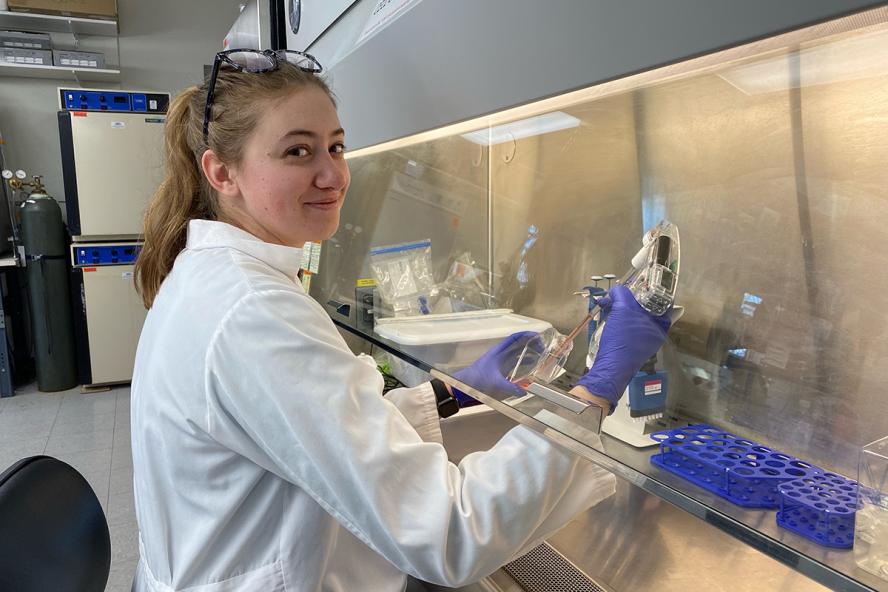-
About
- Leadership & Faculty
- News & Events
-
Academics
- Graduate
- Advanced Clinical Training
- Continuing Education
- Academic Departments
- Academic Offices
- Simulation Experiences
-
Student Life
- Offices
-
Research
-
Hospitals & Clinics
- Emergency Care
- Hospital Services
-
Community Outreach
- Volunteer
- D.V.M. Technical Standards
Exploring the Possibilities
Ph.D. student Victoria Primavera studying COVID-19 and tuberculosis in Regional Biosafety Laboratory while pursuing degree

After earning a Bachelor of Science at the University of Vermont with a double major in microbiology & molecular genetics and animal science, Victoria Primavera (she/her) developed an interest in virology and vaccinology while working at Plum Island Animal Disease Center, off the east coast of Long Island, New York.
“Cummings School [of Veterinary Medicine] was one of the few places that offered opportunities to continue Animal Biosafety Level 3 work with Tufts New England Regional Biosafety Laboratory (RBL),” explains Victoria, a Long Island native who moved to Connecticut when she was young.
“I love living in New England and wanted to find a smaller, more intimate program that would allow me to pursue an area of research I was interested in while expanding my knowledge in new directions.” She found it at Cummings School, where she is pursuing a Ph.D. in biomedical sciences.
The RBL hosts laboratories and vivarium spaces for biosafety level three pathogen work. “It allows us to use animal models and study existing and emerging infectious diseases that require higher biocontainment; in my case SARS-CoV-2 (COVID-19) and TB (tuberculosis),” Victoria says.
Thrilled to dive into research under the co-mentorship of Drs. Saul Tzipori and Amanda Martinot (she/her), much of Victoria’s work to date has been centered on the validation of mouse and hamster models for COVID-19, as well as the optimization of virology and immunological assays. “I gather the tools we need established so we can begin asking questions,” she explains.
Tzipori is a distinguished professor and Martinot is an assistant professor in the Department of Infectious Disease and Global Health (IDGH). “They both have a wealth of knowledge across a wide variety of infectious disease pathogens and immune response,” Victoria shares. “Dr. Martinot is an inspiration for dedication and hard work, maintaining her excitement for science even when she emails me back at 2 a.m. Dr. Tzipori has much experience as a mentor and has been there when I need him, but also encourages my development as an independent scientist.”
Victoria is quick to credit Dr. Sally Robinson, associate director of RBL research operations, who has “taught me the ins and outs of the RBL and without whom I never could have learned how to run animal studies. She’s an amazing scientist, always available to teach new protocols or talk through and troubleshoot issues.”
Cummings School’s Ph.D. in biomedical sciences is a bit different than others, according to Victoria, but has its advantages. “The formal education offers more flexibility in comparison to other programs that I know of,” Victoria says, in full appreciation of traveling to Tufts’ Boston campus and other area universities to round out her coursework. “Additionally, the IDGH department is highly collaborative, which has only worked to my benefit as we investigate various questions regarding SARS-CoV-2 through the development of valuable animal models.”
Martinot explains how the Ph.D. program employs a tailored approach. “Each student first identifies the person they want to work with, instead of applying then finding a mentor that will accept them into a lab,” she says.
Students match up specifically with a mentor and the projects on which they are working and typically enter the program with a project that has established goals and funding. “We hope each student hits the ground running and has a streamlined experience in the program,” Martinot shares.
Currently working on her qualifying exam to transition from a Ph.D. student to a candidate, Victoria is eager to delve deeper into her research while she decides what path to take after earning her degree.
“I am hoping to start digging into the impact of T-cell responses to SARS-CoV-2 infection, like site-specific tissue-resident memory cells and how the mucosa spatially dictates immunological response to vaccination, therapeutics, and disease,” she explains. T-cells, a type of white blood cells called lymphocytes, help one’s immune system fight germs and provide protection from disease.
“I’ve been working on a flow cytometry intracellular staining panel to characterize T-cells and their polyfunctional cytokine response as part of this, but our animal models can also provide us invaluable data through pathology, changes in viral load, and disease symptoms.” Polyfunctional cytokines provide a more effective immune response to a pathogen than do cells that produce only a single cytokine.
With the education and experience Victoria is gaining at Cummings School, she looks forward to a bright future.
Doctor of Philosophy in Biomedical Sciences program
Cummings School of Veterinary Medicine’s Ph.D. in biomedical sciences offers an opportunity to acquire scientific knowledge, technical and communication skills in research areas such as infectious diseases, neuroscience and reproductive biology, pathology, clinical science, and human-animal interactions (HAI).
Learn More
Department:
Ph.D. in Biomedical Sciences